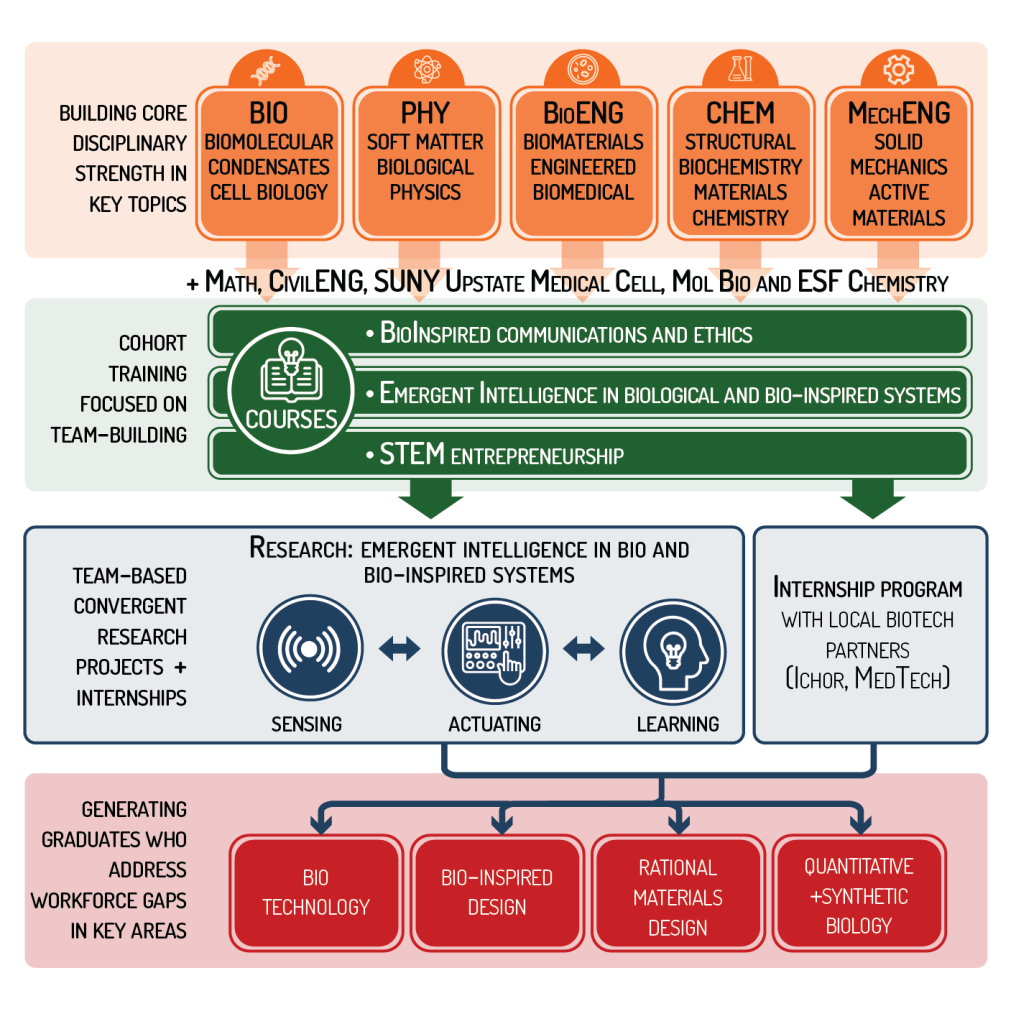Contact: BioInspiredNRT@syr.edu
Many of our society’s most pressing challenges – including food security, sustainability, and supporting aging populations – will require breakthroughs in biotechnology and bio-inspired science. This National Science Foundation Research Traineeship (NRT) award to Syracuse University allows us to train a new generation of scientists and engineers who can evaluate and harness complex systems, such as biological tissues or next-generation materials, to drive intelligent responses such as sensing, actuating, and learning, leading to breakthrough technologies in fields spanning the life and physical sciences and engineering. Opportunities for NRT participants include:
- Learn about cutting-edge topics in team-based interdisciplinary courses including Emergent Intelligence in Biological and Bio-Inspired Systems, STEM Entreprenuership, and BioInspired Communication and Ethics
- Join an active cohort of interdisciplinary students across Syracuse University and SUNY Upstate Medical University campuses who are interested in team-based science for work and social activities
- Work with a primary mentor in your department and a team of co-mentors in other departments to learn new skills
- Apply for program-dedicated seed funding for graduate-student led projects and conference participation
- Participate in an internship track for students interested in entrepreneurship and industry positions
- Engage in a highly assessed professional development program with micro-credentialing for key transferrable skill sets
The innovative, team-based curriculum and research program builds STEM workforce capacity by training people who thrive on high-performing interdisciplinary teams, where each member of the team contributes unique and deep disciplinary expertise while still communicating their knowledge across a diverse team to drive discoveries not possible within a single discipline.

We train Ph.D. students to identify and characterize emergent behaviors – characteristics of composite systems that are not expected from studying one sub-unit but instead require interactions between multiple units – and exploit such behaviors to drive intelligent reactions. These include sensing the environment, actuating in response, and ultimately altering internal interactions to learn how to execute specific tasks. This research helps address major open questions in biology and materials design, as biological organisms harness the emergent behavior of components at smaller scales to generate intelligent structures that perform tasks at larger scales, and similar principles can be used to design new intelligent materials and devices that address societal grand challenges.
The curriculum supports these goals by first training students in core disciplinary competencies, then providing explicit curricular training in interdisciplinary team building via the evidence-driven “Team-Based Learning” paradigm, and ultimately engaging students on research teams along with world-expert faculty from diverse disciplinary backgrounds. The project also provides longitudinal entrepreneurship training so that students are able to commercialize their discoveries and work in industrial settings. This training will help students bring their research discoveries to market to help address grand societal challenges including in sustainability and healthcare. Some examples of translational work:
- Intelligent bacterial-sensing shape memory polymers for use as wound dressings and in food surveillance
- Mechanical multi-functional computers will function robustly at low power and in high damage environments
- Emergent behavior of protein condensates has been implicated in neurodegenerative diseases, potentially suggesting new targets for therapeutics.
